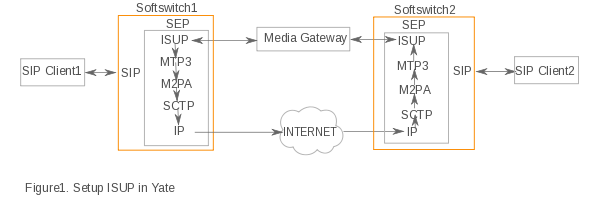How to configure ISUP in Yate
(→Prerequisite) |
(→Testing the setup) |
||
| (2 intermediate revisions by one user not shown) | |||
| Line 14: | Line 14: | ||
:Download a copy of Yate<br> | :Download a copy of Yate<br> | ||
:Yate needs to be configured with command: ./configure --enable-sctp=yes. | :Yate needs to be configured with command: ./configure --enable-sctp=yes. | ||
| + | |||
| + | ===Parameters & Source=== | ||
| + | Parameters: | ||
| + | * pointcodetype | ||
| + | * format | ||
| + | * remotepointcode | ||
| + | * lockgroup | ||
| + | * earlyacm | ||
| + | * inn | ||
| + | * numplan | ||
| + | * numtype | ||
| + | * presentation | ||
| + | * screening | ||
| + | * callercategory | ||
| + | * channelsync | ||
| + | * userparttest | ||
| + | * t9 | ||
| + | * continuity | ||
| + | * confirm_ccr | ||
| + | * drop_unknown | ||
| + | * ignore-grs-single | ||
| + | * ignore-cgb-single | ||
| + | * ignore-cgu-single | ||
| + | * duplicate-cgb | ||
| + | * parttestmsg | ||
| + | * ignore-unknown-digits | ||
| + | * sls | ||
| + | * maxcalleddigits | ||
| + | * print-messages | ||
| + | * extended-debug | ||
| + | |||
| + | Source: | ||
| + | |||
| + | * libs/ysig/isup.cpp | ||
===Building the setup=== | ===Building the setup=== | ||
| Line 193: | Line 227: | ||
'''See also''' | '''See also''' | ||
| − | * [[SS7 | + | * [[How_To's#SS7_Setups | SS7 Setups]] |
Latest revision as of 14:23, 26 October 2017
We will setup a ISUP configuration in Yate to make calls.
Below is a image that describes the configuration.
So there are 2 Yate that are configured as a softswitch, each of them will act as a SIP server and a SS7 SEP in the network. The Clients used will be Yate SIP Clients that will communicate with Yate on SIP protocol, then the call is routed through SS7 to the corresponding SEP. The message will be read at each level in the order shown in the image: SCTP, M2PA, MTP3, ISUP and then routed in SIP and send to the destination.
Contents |
[edit] ISUP configuration
[edit] Prerequisite
- SCTP:
- On the machines where ISUP will be configured SCTP must be installed and compiled.
- Yate:
- Download a copy of Yate
- Yate needs to be configured with command: ./configure --enable-sctp=yes.
[edit] Parameters & Source
Parameters:
- pointcodetype
- format
- remotepointcode
- lockgroup
- earlyacm
- inn
- numplan
- numtype
- presentation
- screening
- callercategory
- channelsync
- userparttest
- t9
- continuity
- confirm_ccr
- drop_unknown
- ignore-grs-single
- ignore-cgb-single
- ignore-cgu-single
- duplicate-cgb
- parttestmsg
- ignore-unknown-digits
- sls
- maxcalleddigits
- print-messages
- extended-debug
Source:
- libs/ysig/isup.cpp
[edit] Building the setup
We are going to use 2 Softswitches with Yate installed and configured with ISUP to make calls (see the configuration for Server1 and Server2).
Each ISUP will have the same list of circuits.
The transport will be done over SCTP and is set in sigtransport.conf file.
The configuration of SS7 signaling will be done in ysigchan.conf and will consist of: Linkset: MTP3, Link: m2pa and Trunk: ISUP.
The voice is configured in mgcpca.conf.
For transmitting the voice another machine will be used (see Server3) that will act as a Media Gateway.
[edit] Server1 (IP:192.168.168.156)
Transport it is done over SCTP:
sigtransport.conf
;The name of the section identifies the connection [sctp-m2pa] type=sctp stream=false ;Primary local address local=192.168.168.156:5050 remote=192.168.168.200:6999
SS7 signalling configuration
ysigchan.conf
;SS7 MTP3 network (linkset) [mtp3] type=ss7-mtp3 ;Comma separated list of point code types used to map an ;incoming network indicator to a specific point code type netind2pctype=ITU netindicator=national ;Declare a local pointcode for the SS7 network local=ITU,0-0-6 ;Build an adjacent route for the SS7 network adjacent=ITU,0-0-5 ;Name of a SS7 Layer 2 link to create in the linkset link=m2pa ;SS7 M2PA link [m2pa] type=ss7-m2pa sig=sctp-m2pa ;SS7 ISUP trunk [isup] type=ss7-isup netindicator=national pointcodetype=ITU pointcode=0-0-6 remotepointcode=5 defaultpointcode=6 voice=mgcpca
Voice it is set in:
mgcpca.conf
[gw mgcpca] user=ACgw101 host=192.168.168.77 port=2427 address=192.168.168.77 voicechans=1-15.17-31 chans=31 start=1 [engine]
Configure user for test:
regfile.conf
[333] password=mysecret1
[edit] Server2 (IP:192.168.168.200)
Transport it is done over SCTP:
sigtransport.conf
[sctp-m2pa] type=sctp stream=false local=192.168.168.200:6999 remote=192.168.168.156:5050
SS7 signalling configuration:
ysigchan.conf
[mtp3] type=ss7-mtp3 netind2pctype=ITU netindicator=national local=ITU,0-0-5 adjacent=ITU,0-0-6 link=m2pa [m2pa] type=ss7-m2pa sig=sctp-m2pa [isup] type=ss7-isup netindicator=national pointcodetype=ITU pointcode=0-0-5 remotepointcode=6 defaultpointcode=5 voice=mgcpca
Voice it is set in:
mgcpca.conf
[gw mgcpca] user=ACgw101 host=192.168.168.77 port=2427 address=192.168.168.77 voicechans=1-15.17-31 chans=31 start=1 [engine]
Configure user for test:
regfile.conf
[222] password=mysecret2
regexroute.conf
[default] .*=sig/\0;trunk=isup
[edit] Server3 (IP:192.168.168.77)
Configuring mgcp gateway and the 2 EndPoints that are set in each machine (in Server1 and in Server2):
mgcpgw.conf
[engine] enabled=yes address=0.0.0.0 request_ack=no send_provisional=no retrans_interval=0 retrans_count=0 [ep ACgw100] local_user=ACgw100 local_host=192.168.168.77 remote_host=192.168.168.200 [ep ACgw101] local_user=ACgw101 local_host=192.168.168.77 remote_host=192.168.168.156
regexroute.conf
[default] .*=dumb/
[edit] Testing the setup
Server1 and Server2 are started then Server3.
Two Yate clients can be used to register the users configured.
Then calls are made from one client to another.
See also
